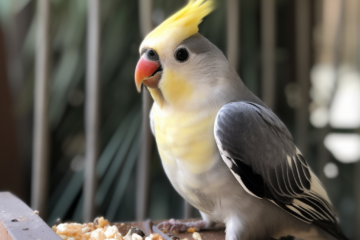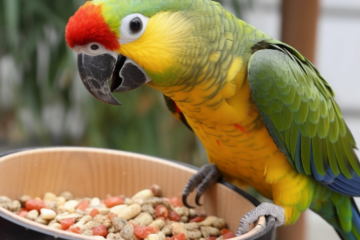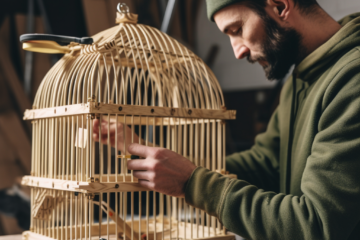Did you know that female pet birds can lay eggs, even without a mate? It’s quite surprising! If you find yourself in this situation, fret not. Handling your pet bird laying an egg is crucial for her health and well-being. So, what steps should you take when faced with this unexpected event? From providing proper nutrition to creating a suitable nesting area, caring for a bird that has laid an egg requires attention to detail and sensitivity. Stay tuned as we unravel the essential tips on how to navigate this unique scenario with care and expertise.
Understanding Egg Laying in Pet Birds
Egg Laying Process
Female pet birds have the ability to lay eggs, even without a mate. The frequency of egg laying can vary depending on the species and individual bird. Some birds may lay eggs regularly, while others may do so occasionally.
Birds typically exhibit natural instincts and behaviors associated with egg laying. They might become protective of their eggs, sitting on them to keep them warm. It is crucial for bird owners to recognize these signs and provide appropriate care during this time.
Providing Proper Care
When your pet bird lays an egg, it is essential to ensure they have a comfortable nesting area with enough privacy. Create a quiet space where the bird feels secure to tend to its eggs.
Maintain a balanced diet for your pet bird that includes egg-laying supplements if recommended by a veterinarian. This helps ensure that the bird receives adequate nutrition during this period.
Seeking Veterinary Advice
If you notice any concerning symptoms or behaviors in your pet bird during the egg-laying process, consult a veterinarian promptly. They can provide guidance on how to care for your bird and address any health issues that may arise.
Regular check-ups are crucial for monitoring your pet’s overall health and well-being, especially during periods of increased stress such as egg laying.
Immediate Steps After Your Bird Lays an Egg
Provide a Safe Nesting Area
When your pet bird lays an egg, ensure it has a comfortable and safe nesting area. Offer soft materials like paper towels or shredded paper for the bird to build its nest. Place the nest in a quiet spot away from high traffic areas to minimize disturbances.
It’s crucial not to disturb the nest or remove the egg immediately after it is laid. Allow your bird time to settle into its new role as a potential parent. Removing the egg prematurely can cause stress and anxiety for your bird, leading to potential complications in the future.
Monitor Closely for Distress Signs
Keep a close eye on your pet bird post-egg laying for any signs of distress or complications. Look out for behaviors such as excessive fluffing of feathers, decreased appetite, lethargy, or persistent sitting at the bottom of the cage. These could indicate underlying health issues that require immediate attention.
Managing Hormones to Prevent Excessive Egg-Laying
Avian Veterinarian Consultation
Consulting with an avian veterinarian is crucial when your pet bird lays an egg. Avian veterinarians specialize in bird health and can provide valuable insights on managing hormones in birds. They can recommend specific treatments or adjustments to prevent excessive egg-laying. Seeking professional advice ensures the well-being of your feathered friend and helps address any underlying health issues that may be contributing to the behavior.
Seeking guidance from an avian veterinarian allows for a tailored approach to hormone management based on your bird’s individual needs. Professional recommendations might include dietary changes, supplements, or medications to regulate hormone levels effectively. Avian veterinarians can also conduct thorough examinations to rule out any medical conditions causing abnormal egg-laying patterns in birds.
-
Consulting with an avian veterinarian is essential.
-
Professional advice ensures tailored hormone management.
-
Recommendations may include dietary changes or medication.
Lighting Schedule Adjustment
Adjusting lighting schedules can play a significant role in regulating hormonal activity and preventing excessive egg-laying in pet birds. Proper lighting mimics natural daylight cycles, influencing hormonal balance and reproductive behaviors in birds. Ensuring consistent periods of light and darkness each day helps maintain a stable hormonal environment for your feathered companion.
By providing adequate lighting during the day followed by periods of darkness at night, you help establish a routine that supports healthy hormone regulation. This practice simulates the natural conditions birds would experience in their native habitats, promoting overall well-being and reducing the likelihood of erratic egg-laying behaviors.
-
Proper lighting schedules mimic natural daylight cycles.
-
Consistent light-dark periods support healthy hormone regulation.
-
Simulating natural conditions reduces erratic egg-laying behaviors.
Diet and Nutrition for Preventing Egg-Laying
Balanced Diet with Appropriate Calcium Levels
Ensure your pet bird is getting a balanced diet rich in essential nutrients. Include foods like pellets, fresh fruits, vegetables, and seeds. Offer calcium-rich sources such as cuttlebone or mineral blocks to support bone health.
A lack of calcium can trigger egg-laying in birds. Make sure your bird’s diet includes adequate calcium to prevent complications like thin-shelled eggs or egg-binding. Consult with a veterinarian to determine the right amount of calcium needed for your bird’s specific breed and size.
Limit High-Calorie Foods
Avoid feeding your bird excessive amounts of high-calorie foods like seeds and nuts that can stimulate reproductive hormones. These foods may lead to increased egg production in female birds due to the surplus energy they provide.
Offer treats sparingly and opt for healthier options like leafy greens or small portions of fruits instead of fatty snacks. Keep an eye on portion sizes to maintain a healthy weight for your bird without encouraging frequent egg-laying.
Consulting with a Veterinarian
Seek professional advice from a veterinarian specializing in avian care when planning your pet bird’s diet. They can create a personalized diet plan tailored to meet the nutritional requirements of your specific bird species.
Discuss any concerns you have regarding your pet’s dietary habits and potential triggers for excessive egg-laying. A vet can offer guidance on adjusting the diet, including recommendations on supplements or changes necessary to manage hormonal behaviors effectively.
Modifying Environment and Behavior to Discourage Egg-Laying
Remove Nesting Materials
Removing potential nesting materials from your pet bird’s environment is crucial in discouraging egg-laying. Avoid providing items like paper, tissues, or shredded materials that mimic a nest. These materials can trigger your bird’s natural instinct to lay eggs.
Creating an environment devoid of nesting material helps signal to your bird that it is not the right time for breeding. Instead, offer alternative items such as chew toys, swings, or puzzles for mental stimulation without promoting nesting behaviors.
Encourage Exercise and Social Interaction
Regular exercise and social interaction are essential in distracting your pet bird from engaging in nesting behaviors. Providing opportunities for physical activity through flying or playing can help redirect its focus away from egg-laying tendencies.
Moreover, spending quality time with your bird by interacting through talking, singing, or training sessions can further prevent feelings of loneliness or boredom that may lead to egg-laying. By fostering a bond through social engagement, you create a positive distraction from reproductive behaviors.
Stimulating Environment with Toys and Activities
Creating a stimulating environment filled with toys and activities is key to keeping your pet bird mentally engaged and occupied. Offer a variety of toys such as puzzle feeders, bells, ropes, or mirrors to provide enrichment and prevent monotony.
Toys that encourage natural foraging instincts can be particularly beneficial in diverting attention away from egg-laying behavior towards more interactive playtime. Rotating toys regularly also helps maintain novelty and prevents boredom-induced habits like excessive preening or egg laying.
Handling Fertile and Infertile Eggs
Preventing Fertilization
If you don’t want your pet bird to breed, it’s crucial to prevent the fertilization of eggs. This can be achieved by removing any bowls or nesting materials from the cage. By eliminating these triggers, you reduce the likelihood of egg-laying in the first place.
To further deter breeding behavior, ensure that your bird gets plenty of exercise and mental stimulation. Providing a varied diet and limiting daylight hours can also help regulate hormonal fluctuations that lead to egg production.
Dealing with Fertile Eggs
Fertile eggs should not be incubated unless you are fully prepared for the responsibilities involved in raising chicks. If you do not wish to have baby birds, it is best to discard fertile eggs immediately after they are laid. This prevents any potential hatching and eliminates the need for caring for offspring.
When handling fertile eggs, avoid turning them as this could initiate embryonic development. Keep them at room temperature if they are not being incubated until you dispose of them properly.
Safely Discarding Infertile Eggs
Infertile eggs can be safely discarded once you confirm they are not being incubated by the parent bird. These eggs will typically appear translucent when candled, indicating their lack of development inside.
To dispose of infertile eggs responsibly, wrap them in a paper towel before discarding them in the trash bin securely sealed bag or container. Avoid leaving discarded eggs within reach of other pets as they might find them appealing but harmful if consumed accidentally.
Dealing with Egg Binding in Pet Birds
Understanding Egg Binding
Egg binding is a critical condition in pet birds when they struggle to lay an egg. It can be painful and potentially life-threatening for the bird. If you notice your pet bird having difficulty passing an egg, it’s crucial to act promptly.
When a bird is experiencing egg binding, it may appear lethargic, fluff its feathers, or strain excessively while trying to lay the egg. In severe cases, the bird might even show signs of distress by vocalizing loudly or continuously.
Seeking immediate veterinary assistance is vital if you suspect your pet bird is suffering from egg binding. A veterinarian will be able to assess the situation accurately and provide appropriate treatment options tailored to your bird’s needs.
Treatment Options for Egg Binding
Veterinarians may recommend several measures to help resolve egg binding in pet birds. One common approach involves providing warm baths for the affected bird. The warmth can help relax the muscles and potentially facilitate passing the egg more easily.
Gentle massage around the abdomen area might also be suggested by a vet as part of the treatment plan for egg binding in pet birds. This technique aims to aid in stimulating contractions that could assist in expelling the stuck egg.
-
Pros:
-
Prompt veterinary intervention can save your pet bird’s life.
-
Simple interventions like warm baths and massage can sometimes resolve mild cases of egg binding quickly.
-
Cons:
-
Severe cases of egg binding may require more invasive treatments such as surgery.
Preventing Unwanted Egg Laying in the Future
Limit Hormonal Triggers
Birds, like many animals, can be triggered to lay eggs by environmental factors. Limit exposure to nesting materials like paper shreds or cozy corners that mimic nests. Providing a varied environment with plenty of toys and activities can help distract your bird from nesting behaviors.
Implementing strategies such as rearranging cage accessories frequently can also prevent your bird from becoming too attached to a particular spot for nesting. By minimizing potential triggers, you can reduce the likelihood of unwanted egg laying in the future.
Regular Veterinary Check-Ups
Regular visits to an avian veterinarian are crucial for monitoring your pet bird’s reproductive health. Ensure that your vet conducts thorough examinations to detect any early signs of reproductive issues. They may recommend dietary changes or adjustments in environmental conditions based on their findings.
Consistency is key. Your vet will provide guidance on how often these check-ups should occur based on your bird’s age and overall health status.
Considerations for Allowing Bird to Have Babies
Considerations for Allowing Bird to Have Babies
Breeding your pet bird should be a decision made with careful thought and consideration. Before proceeding, ensure you have the necessary knowledge, resources, and commitment to care for the offspring that may result from breeding. Research the specific needs of the bird species you intend to breed; different species have varying requirementsDiet, and environmental conditions.
Consulting with experienced breeders or avian veterinarians is crucial throughout the breeding process. They can provide valuable guidance on how to properly care for both the parent birds and their potential offspring. By seeking advice from those with expertise in bird breeding, you can ensure that you are equipped with the right information to handle any challenges that may arise during this process.
Considering allowing your pet bird to have babies also involves ensuring suitable homes for any potential offspring that may hatch. Having a plan in place for finding responsible owners who will provide proper care for the baby birds is essential before deciding to proceed with breeding. Remember, responsible breeding practices help prevent issues such as overpopulation and ensure that all birds receive adequate care throughout their lives.
-
Pros:
-
Allows you to experience the joy of witnessing new life.
-
Can contribute positively towards conservation efforts if done responsibly.
-
Cons:
-
Requires significant time commitment and financial investment.
-
May lead to challenges in finding suitable homes for all offspring.
Providing Proper Care During Breeding Process
During the breeding process, it’s essential to monitor your pet bird closely for any signs of distress or health issues. Ensure they have access to a nutritious diet rich in calcium since egg-laying can deplete their calcium levels rapidly. Providing a calm and stress-free environment is crucial as excessive noise or disruptions can negatively impact your bird’s well-being.
Setting up a comfortable nesting area where your bird feels safe is vital for successful egg incubation. Make sure there are appropriate nesting materials available such as shredded paper or wood shavings based on your bird species’ preferences. Regularly check on the nest box without causing unnecessary disturbances; this allows you to observe any changes in behavior or detect potential problems early on.
-
Keep track of how many eggs are laid by marking them carefully with a pencil. 2..
You’ve now got a handle on what to do when your pet bird lays an egg. Remember, understanding your bird’s behavior and needs is key. Take immediate steps, manage those hormones, watch their diet, and tweak their environment. By handling eggs properly and knowing how to deal with potential issues like egg binding, you’re already ahead of the game. Preventing unwanted egg-laying in the future is possible with the right care. And if you’re considering letting your bird have babies, make sure you’re fully prepared for the responsibility. Your feathered friend relies on you for the best care possible. Keep learning and adapting to ensure they lead a happy, healthy life.
Frequently Asked Questions
How common is it for pet birds to lay eggs?
It’s quite common for female pet birds, even without a mate, to lay eggs. Factors like age, environment, and hormonal fluctuations can trigger egg-laying behavior.
What should I do if my pet bird lays an egg unexpectedly?
If your bird lays an egg out of the blue, ensure she has a quiet, warm spot with access to fresh water and food. Monitor her closely for any signs of distress or complications.
Can I remove the egg once my bird lays it?
Yes, you can remove infertile eggs after your bird has laid them. However, avoid disturbing her nest excessively as this could stress her out and lead to more egg-laying.
How can I prevent my pet bird from laying too many eggs?
To prevent excessive egg-laying in your pet bird, focus on managing her environment by adjusting lighting schedules and ensuring she gets enough mental stimulation through toys and interaction.
Is it safe for my pet bird to have babies if she lays fertile eggs?
While breeding can be rewarding, consider the responsibilities involved in caring for the offspring before allowing your pet bird to hatch fertile eggs. Ensure you have the knowledge and resources needed to support healthy baby birds.


